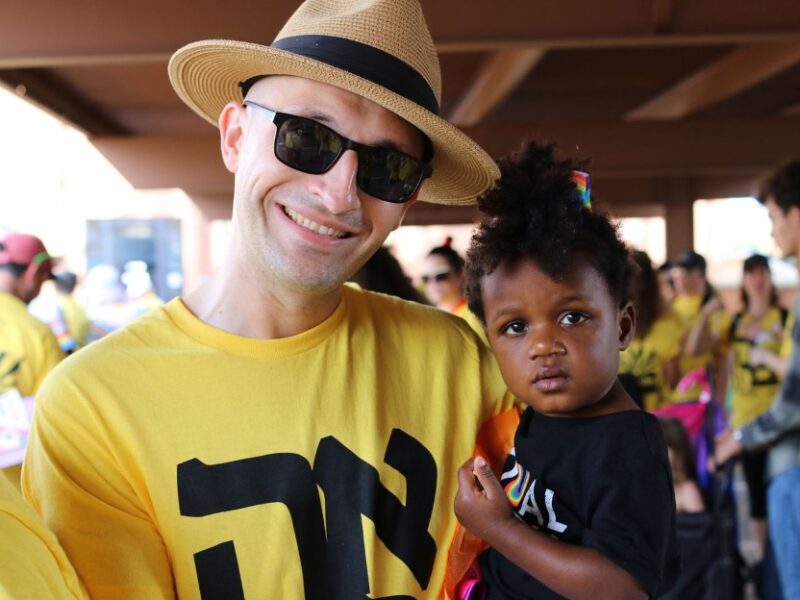Through a combination of serendipity and intuition, Tucson resident Jill Bash cut her stage 1A ovarian cancer off at the pass – ultimately saving her life. Although testing negatively for BRCA I and II genetic mutations (which increase risk for breast and ovarian cancers), the disease still sideswiped her. As an eight-year survivor, Bash’s passion is palpable as she talks about empowering other women to save their lives through early detection. Outgoing and affable by nature, Bash talks to women in stores, doctor’s offices, expos and social events – anyone who will listen to her inspiring story.
The pivotal year for Bash was 1985. “The car I was riding in was struck from behind, and I was in the rear and in the middle,” she begins. “A drunk driver came over the line, hit our car from behind and I developed a neuralgia in my face from injured nerves. A main nerve was injured and I required surgery on my nose. To deal with the pain, I have had to take medications for facial pain for the past 35 years.”
In 2005 Bash was put on promising medication for her excruciating pain, which she describes as the worst toothache imaginable. The caveat was that it might cause nausea and indigestion. At the end of the expected time span of two weeks, the nausea not only lingered … it intensified.
Little did Bash know a surprising quirk of fate would soon intervene and shed light on the mysterious symptoms. While reading an article in a women’s magazine, she discovered that her symptoms were identical to those of women who have ovarian cancer. “I started to put two and two together and had no problem seeking help at that point,” she relates. “I had medical problems with my face for 30 years; I was used to seeking doctors out.”
After describing her symptoms to her gynecologist, Bash was quickly given a transvaginal ultrasound and blood test to test for a tumor marker. The sobering result was the discovery of a 9.5-centimeter endometrial ovarian tumor. The good news, though, was that it could be quickly removed by a hysterectomy. Bash relates she vaguely remembers the doctor coming in after her hysterectomy and telling her she needed to follow up with an oncologist, which is how she knew she had cancer.
Fortunately it was stage 1A, the earliest stage of cancer, and it had not spread,” she says. “So yay to me for catching this thing myself and putting the symptoms together. I felt like the luckiest person alive. I would be here for my husband, my daughters and my granddaughter.”
Women with stage 1A cancer have a choice of stopping with a hysterectomy or having chemotherapy treatment. Determined to stack the deck in her favor and halt a recurrence, Bash decided on chemotherapy. “The sessions lasted 45 minutes, a relatively short time compared to others who took hours,” says Bash. “It was a phenomenal experience; I felt like I was in a sisterhood. This is not a club you want to belong to, but during the process, I met incredible strong women who gave me really great support.”
Due to the subtlety of the symptoms of OC, doctors can tragically miss the mark when making a diagnosis. “Doctors don’t think of OC as the reason for gassiness and bloating,” says
Bash. “Typically they think the issue is indigestion or irritable bowel syndrome. By the time you get off the ‘medical merry- go-round’ the cancer can spread to level 3 if you are not vigilant about your suspicion.”
Thanks to her pro-activeness, Bash now leads a relatively stable life, visiting her oncologist once a year. She enjoys a rich life of traveling, reading and spending cherished time with her daughters and 2-year- old granddaughter. A self-taught artist since childhood, drawing and painting have always been a source of comfort and strength for her, and she continually creates colorful acrylic paintings. “Art is a great distraction for my pain,” she says.
Bash says she has a very strong Jewish identity although not as a frequent synagogue participant. “I celebrate holidays with my family and read lots of books
on Judaism. Family is the most important thing to me, and I am thrilled my daughters are not at (increased) risk for OC. Being a survivor means being with and loving your family, and that is essentially what Judaism is all about.”
Bash is currently active in the Tucson Chapter of the National Ovarian Cancer Coalition, whose mission is to raise awareness and promote education about ovarian cancer. The group’s premier fundraiser is the Teal Tea held every September.
Symptoms of Ovarian Cancer
Ovarian cancer is often called the “silent” killer because early symptoms of ovarian cancer are often mild, making this disease difficult to detect.
Bloating
Pelvic or abdominal pain
Difficulty eating or feeling full quickly
Urinary symptoms (urgency or frequency)
See your doctor, preferably a gynecologist, if these symptoms are unusual for you and occur almost daily for more than a few weeks. Experts suggest a combination pelvic/rectal exam, CA125 blood test and a transvaginal ultrasound.
NOCC: 1-888-682-7426, ovarian.org | OCNA: ovariancancer.org





